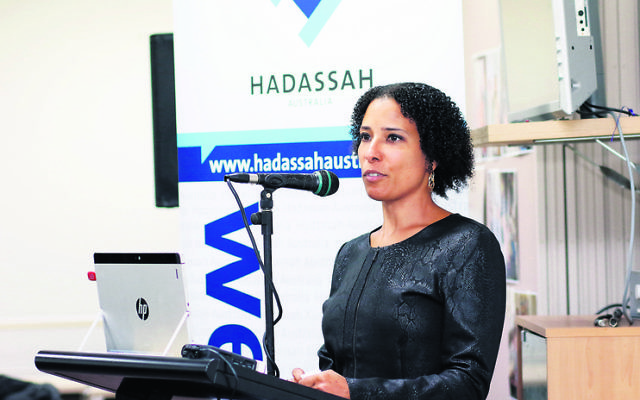Medicine, the path to Arab–Israeli peace
"I SEE all women as women." Mushira Aboo Dia is an Israeli-Arab obstetrician and gynaecologist, practising at Hadassah Hospital and Bat Ami in Jerusalem. With deep divisions entrenched in a complex society, the maternity wards are no different. But there are also shared stories to be found, reflected Aboo Dia in conversation with The AJN. Aboo Dia is visiting as a guest of Hadassah Australia and addressed more than 40 women at the National Council of Jewish Women of Australia (Victoria) on Sunday.
REBECCA DAVIS
“I SEE all women as women.”
Mushira Aboo Dia is an Israeli-Arab obstetrician and gynaecologist, practising at Hadassah Hospital and Bat Ami in Jerusalem.
With deep divisions entrenched in a complex society, the maternity wards are no different.
But there are also shared stories to be found, reflected Aboo Dia in conversation with The AJN. Aboo Dia is visiting as a guest of Hadassah Australia and addressed more than 40 women at the National Council of Jewish Women of Australia (Victoria) on Sunday.
Jabel Mukaber is a suburb of Arab East Jerusalem; Bet Shemesh is a city with a large ultra-Orthodox population. Aboo Dia has worked in maternity clinics in both areas. She also serves a mobile pregnancy clinic which visits different Palestinian cities of the West Bank each Saturday.
“But when you go inside the delivery room … all women are the same,” told Aboo Dia.
“She doesn’t wear her hijab if she is Arabic. She doesn’t wear her wig if she is ultra-Orthodox … They get rid of all the external differentiators, and they are just women – and my patients.”
As two conservative communities, there are also similarities when facing particular issues. Convincing women to partake in Pap tests is a challenge, “but improving”. And then there is dealing with sexual assault.
“They don’t deal,” Aboo Dia simply stated, “because they value the family unity a lot more than they value the individual welfare or wellbeing.
“And it is not something that they would speak about, because they will be afraid that it will harm the family as a unit.”
Sexual assault is shrouded in an abyss of silence, allowing for a culture of complicity. Aside from enduring the trauma of the assault itself, the woman commonly suffers the ramifications of reduced marriage prospects, for her or her siblings.
In the ultra-Orthodox community, “theoretically they will sit shiva on you and disown you and not recognise you”.
But the consequences in the Arab community are far more dire.
Aboo Dia illustrated the commonly held view that a woman who is unmarried and presumably still a virgin needs to preserve her virginity and respect so the family honour will not be shamed.
“If she was sexually assaulted or raped, it doesn’t matter. She will have to marry the rapist because they already had sexual intercourse, and he should marry her in order for her not to shame the family honour.
“And in the worst case scenario, she may be murdered by one of her brothers or cousins,” Aboo Dia continued.
Just two months ago, 24-year-old Jaffa man Farhdi Malouk, was charged with fatally stabbing both of his 19 and 21-year-old sisters as they slept in their beds.
It was reported that he was offended by them going out with men.
What is the answer to the silence that enables violence against women, and stops them reporting abuse?
“Trying to ask the question in a more culturally sensitive way,” said Aboo Dia, who also is a strong advocate for working alongside senior members within the respective communities “without them feeling that you come as an outsider and as an external force”.
It is work that Project Rozana is currently engaged in at the Hadassah sexual assault treatment centre.
And then there are other measures aiming to bridge the gap between Palestinians and Israelis like the Patient Navigators program – Arabic speaking teams who provide support and engagement between patients and hospital staff.
As attending physician in the delivery room, Aboo Dia spoke on the importance of ensuring that a Palestinian woman feels understood while receiving treatment.
“I will speak to her in her own language … and I stress the fact that I’m there for her if she needs and if she has difficulty communicating her needs with the staff, she can call me.”
The disconnect of language is symptomatic of a larger disconnect between both peoples, contended Aboo Dia. She recounted some Israeli-Jewish patients who requested not to be seen by an Arab doctor, or not to share a room with an Arab patient.
“There is a lack of getting to know the other side. And when you don’t know the other side, you can think a lot of things about the other side that are not true. But until you come and see it yourself, you feed on the things that you hear in the news.”
While fear may be a driving factor, medicine is the bridge to peace, she explained when reflecting on the success of the mobile clinics in the West Bank. She is joined by both Israeli-Jewish and Israeli-Arab doctors who provide treatment to Palestinians.
“Right now, health care is the only positive interaction that you see. People who give you medical treatment, they don’t see you as an enemy. They don’t think of you as someone who can hurt them and they came to help you … This is the way. Because in medicine you don’t choose your patient, and the patient does not choose their doctor.”


comments